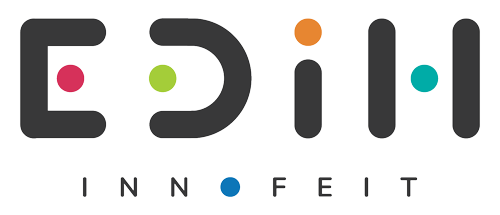This course provides an overview and theoretical background of industrial manipulator robots, and practical exercises for programming and controlling an industrial robotic manipulator, and integrating it in an industrial process. Participants will also learn about safety standards and future trends in robotics. The course is given by IASE at FEEIT.
Course Overview Table
| Chapter | Details |
| Partner | Faculty of Electrical Engineering and Information Technologies – FEEIT |
| Title | Industrial Robotics |
| Service | Course |
| Target Group | Industry, engineers |
| Format | In-person training |
| Focused on Key Technologies | Robotics |
| Status | Ready to offer |
| Stakeholders from SME/PA Side | Engineers, operators and professionals working in manufacturing and automation industry, interested in developing and improving their skills in programming and control of industrial robotic manipulators |
| Requirements for Participation | Basic knowledge of programming and technical background, some industrial experience and basic familiarity with industrial systems are also recommended |
| Estimated Duration | 16 hours (4 days) |
Description of the Course
Introduction
This course offers a practical and focused introduction to industrial robotics, designed for professionals aiming to build or strengthen their skills in robot programming, integration, and control. With a balance of theoretical foundations and hands-on sessions using real equipment, participants will gain confidence working with robotic manipulators in real-world applications.
Technical Context and Examples
As industrial robotics continues to play a central role in manufacturing automation, professionals are expected to understand how robotic manipulators operate, how they are programmed, and how they integrate into larger control systems. This course uses a real industrial robotic arm and PLC systems as a real-world platform to simulate an industrial manufacturing cell. Participants will gain experience working with coordinate frames, motion programming, and signal interfacing between a robot and a PLC-controlled process. Through a structured hands-on approach, they will practice task design, debugging, and optimization of robot behaviour. Additionally, the course introduces essential safety standards in robotic work environments and provides insights into emerging trends such as collaborative robots, vision systems, and the role of robotics in Industry 4.0.
Detailed Explanation of Core Concepts
Participants will first gain a conceptual understanding of robotics, including manipulator structures, kinematics, trajectory planning, and coordinate system use. Special attention will be given to the role of reference frames in robot control and motion. This is followed by an introduction to robotic safety protocols, aligned with international standards. The course then shifts to practical skills, beginning with robot programming fundamentals and hands-on use of the programming software. Attendees will create and test programs for basic motion tasks and gradually build toward integrating the robotic arm into a working cell with a PLC. Concepts of debugging, error handling, and optimization are introduced through live examples. The course concludes with a discussion on current and future directions in robotics, including flexible automation, collaborative systems, and AI-driven robotic solutions.
Tentative Agenda (4 days × 4 hours)
Day 1:
Introduction to industrial robotics
Overview of manipulators, kinematics, trajectories, coordinate systems
Robotic safety standards and examples
Day 2:
Fundamentals of robot programming
Introduction to programming environment
Basic hands-on programming tasks
Day 3:
Advanced programming tasks
Integration with PLC (inputs/outputs, process logic)
Simulating an automated cell
Day 4:
Debugging and troubleshooting techniques
Review and assessment activity
Discussion on future trends in robotics
Conclusion and Unique Value
This course offers an intensive, hands-on experience with professional-grade equipment, making it ideal for engineers and technicians looking to deepen their practical skills in robotics. By combining theory, real-world tools, and emerging trends, participants will leave better prepared to implement and maintain robotic systems in industrial settings.
Additional Course Information
| Category | Details |
| Developed skills | Participants will acquire knowledge and skills, including: |
| Skill 1: Understanding of basics of robotic manipulators;
Skill 2: Basic robot programming proficiency; Skill 3: Robot-PLC integration; Skill 4: Practical troubleshooting; Skill 5: Safety awareness in robotic workspace; Knowledge: Awareness of trends in industrial robotics. |
|
| Learning Methods Used | Lectures, hands-on practical experiments (both individual and in groups), group discussions |
| References/Resources | Learning resources and key references will be provided during the course by the course organizer (Department of Automation and System Engineering, Faculty of Electrical Engineering and Information Technologies). |
| Overview Slides | Supporting slides, literature and documentation will be available for the participants, and are originally developed by the course organizer (Department of Automation and System Engineering, Faculty of Electrical Engineering and Information Technologies). |
